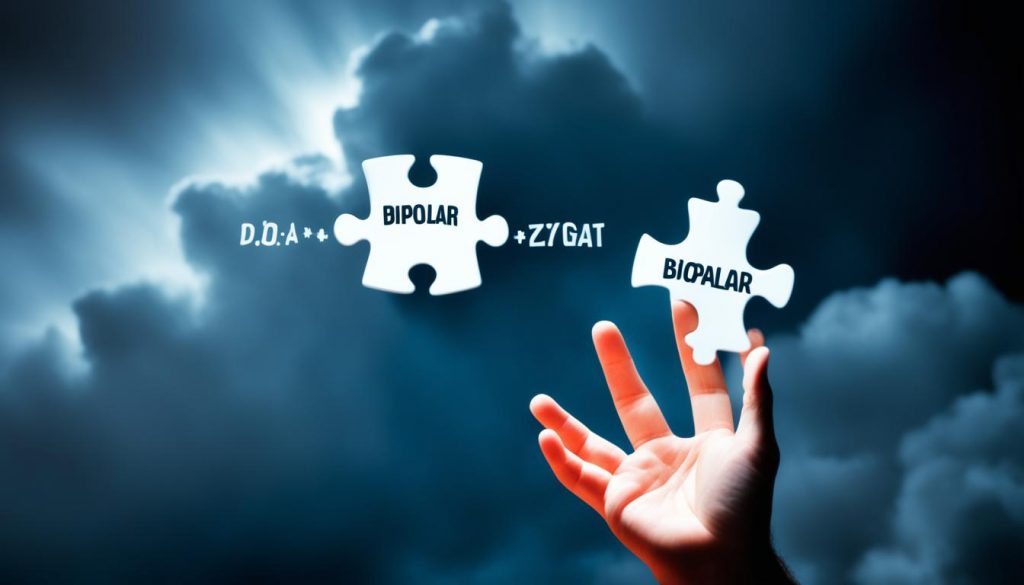Bipolar disorder, also known as manic depression, involves extreme mood changes. This condition has highs, called manic episodes, and lows, known as periods of depression. Around 2 to 3 percent of people worldwide suffer from it, highlighting its significance in mental health.
Key Takeaways:
- Bipolar disorder is a mental illness characterized by extreme mood swings.
- Manic episodes involve elevated mood, increased energy, and impulsive behavior.
- Depressive episodes involve feelings of hopelessness and low mood.
- The exact causes of bipolar disorder are not fully understood, but genetics and abnormalities in brain structure and function play a role.
- Diagnosing bipolar disorder involves a comprehensive evaluation that includes physical and mental health assessments.
Understanding Bipolar Disorder
Bipolar disorder is a mental illness with extreme mood changes. These changes affect how people function every day.
In manic phases, people feel very happy, full of energy, and may make rash decisions. These times can last weeks.
During depressive phases, they feel very sad and lose interest in things they liked. Making choices becomes hard for them.
There are also stable times between the mood swings. Here, their mood and energy are more normal. Yet, dealing with bipolar disorder is always a challenge.
These mood swings can hurt someone’s life a lot. They can affect friendships, work, and how well someone does in school. Getting the right help and support is very important.
Causes of Bipolar Disorder
The exact cause of bipolar disorder isn’t fully understood yet. However, genetic factors and brain structure play big roles.
Bipolar disorder often happens in families, showing genetics are crucial. If your family has it, your risk goes up. Certain genes linked to brain function might increase this risk.
Also, brain areas tied to mood and emotion work differently in those with bipolar disorder. This impacts the brain’s mood regulation, leading to mood swings.
| Causes of Bipolar Disorder | |
|---|---|
| Genetic Factors | Ongoing research indicates a strong genetic component with a higher risk in individuals with a family history of the disorder. |
| Brain Structure and Function | Abnormalities in brain regions involved in mood regulation and emotion processing contribute to bipolar disorder development. |
Not everyone with genetic risk or brain differences will get bipolar disorder. Things like environment and life events also play a part.
Diagnosing Bipolar Disorder
Doctors diagnose bipolar disorder with a detailed check-up. It includes a physical exam, tests, and checking mental health.
The first step is the physical exam. It helps doctors find any health problems causing symptoms. They look for signs of illness or brain issues.
Next, there are medical tests. These might be blood tests or brain scans. They help rule out other causes for symptoms. Blood tests check for imbalances. Brain scans, like MRI or CT scans, look at how the brain is working.
A mental health check is also key. Experts talk to the person about their symptoms and health history. They use tools and guidelines, like the DSM-5, to see if symptoms match bipolar disorder.
They might also talk to the person’s family or friends. This helps them understand the person’s mood swings better. It shows how often mood changes happen and if something triggers them.
In the end, finding out if someone has bipolar disorder needs a look at both physical and mental health. If someone shows symptoms, it’s vital they get help. This way, they can get the right diagnosis and treatment.

| Diagnosis Methods | Description |
|---|---|
| Physical exam | A comprehensive examination to rule out any underlying medical conditions that may be causing the symptoms of bipolar disorder. |
| Medical testing | Blood tests and imaging scans, such as MRI or CT scans, may be conducted to assess hormone levels, chemical imbalances, and brain structure and function. |
| Mental health evaluation | A detailed assessment of the individual’s symptoms, medical history, and family history to determine if they meet the criteria for bipolar disorder. |
| Interviews with family members or close friends | Additional information gathering to provide insights into mood patterns, triggers, and frequency of mood episodes. |
Treatment Options for Bipolar Disorder
Bipolar disorder is a lifelong condition. It requires a thorough treatment plan. Treatments include medications, psychotherapy, and stem cell therapy to improve life quality.
Medications
Medications are key in treating bipolar disorder. The treatment usually involves mood stabilizers and atypical antipsychotics. Mood stabilizers regulate mood swings and prevent manic or depressive episodes. Atypical antipsychotics help manage symptoms like hallucinations.
Working closely with healthcare providers is crucial. They help find the right medication plan. Regular check-ups and medication adjustments might be needed for optimal control of symptoms.
Psychotherapy
Psychotherapy, or talk therapy, is crucial for treating bipolar disorder. There are various approaches, such as cognitive-behavioral therapy (CBT), family-focused therapy (FFT), and interpersonal and social rhythm therapy (IPSRT).
CBT helps change negative thoughts and behaviors. FFT includes family in therapy to enhance support and communication. IPSRT focuses on establishing routines and stress management to avoid mood episodes.
Stem Cell Therapy
Stem cell therapy is a new approach being researched for bipolar disorder. It uses stem cells to fix or replace damaged brain cells. This can restore brain function.
Though still experimental, early studies on stem cell therapy are hopeful. Researchers believe it may improve mood stabilization, lessen mood episodes, and boost brain function.
| Treatment Option | Key Benefits |
|---|---|
| Medications | – Regulation of mood swings – Prevention of manic or depressive episodes – Symptom management |
| Psychotherapy | – Improvement in coping skills – Stress management – Enhanced relationships |
| Stem Cell Therapy | – Potential repair of damaged brain cells – Mood stabilization – Improved brain function |
It’s vital for those with bipolar disorder to collaborate with their healthcare team. They need to find the best treatment plan for them. A mix of medication, psychotherapy, and support greatly aids symptom management. It also improves the quality of life for those with bipolar disorder.
Support and Resources for Bipolar Disorder
People with bipolar disorder have many support systems and resources available. These can greatly help them handle their condition. Here are some helpful options:
Bipolar Disorder Support Groups
Individuals can join support groups for people with bipolar disorder, both in person and online. This offers a community that understands and shares similar challenges. In these groups, people can share their stories, learn from others, and find comfort. Exchanging coping strategies and insights can really make a difference.
Bipolar Counseling and Therapy
Counseling or therapy is critical for managing bipolar disorder. It helps individuals with symptom management, relationship guidance, and developing coping strategies. Skilled therapists can help people understand bipolar disorder, find triggers, and tailor strategies to handle mood swings. It’s also a place to work through issues and explore feelings.
Bipolar Medications
Medications are key in treating bipolar disorder. They work to even out mood swings and make manic or depressive episodes less severe. It’s important for patients to collaborate with their healthcare providers. Finding the best medication plan is crucial. Regular check-ins ensure the treatment works well and adjustments are made as needed.
Bipolar Therapy
Alongside counseling, other therapies are beneficial. Cognitive-behavioral therapy (CBT) helps change negative thoughts and behaviors. Family-focused therapy teaches family members about the disorder and how to communicate better. Interpersonal and social rhythm therapy (IPSRT) aims to stabilize daily routines and sleep to reduce mood swings.
Access to support groups, counseling, medications, and therapy can drastically improve life for those with bipolar disorder. It’s vital that individuals use these resources, participate in their treatment, and seek ongoing support. This approach can help them manage their condition effectively and lead fulfilling lives.
Conclusion
Bipolar disorder is a tough mental health challenge. But with ongoing treatment and support, those affected can lead rewarding lives. They can effectively handle their symptoms.
Traditional treatments like medication and talking therapies have helped many. Yet, stem cell therapy is emerging as a promising future option. This research may lead to better, more specific treatments.
Getting professional help is key for people with bipolar disorder. Support groups and counseling can make a big difference. By staying active in treatment and using these services, they can better their lives.

